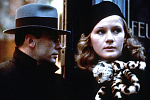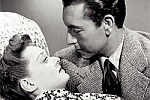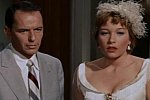 Shadows off the beaten path
Shadows off the beaten pathNOW VOYAGER | SOME CAME RUNNING
< < R E V I V A L S > >
last update 12.Apr.08
See also: SHADOWS FILM FESTIVAL
 R E V I E W B Y R I C H C L I N E
R E V I E W B Y R I C H C L I N E MUST
MUST  SEE
Il Conformista
SEE
Il Conformista
with Jean-Louis Trintignant, Stefania Sandrelli, Gastone Moschin, Dominique Sanda, José Quaglio, Pierre Clémenti, Enzo Tarascio, Pasquale Fortunato, Christian Alegny, Giuseppe Addobbati, Milly, Fosco Giachetti

release It 22.Oct.70
reissue UK 29.Feb.08
70/Italy Paramount 1h51
BERLIN FILM FEST
 With this pristine restoration, Bertolucci's masterpiece is back on the big screen where it belongs. This is one of the finest sex-and-politics thrillers ever made, blending sharp humour with riveting suspense. It also clearly inspired filmmakers from Spielberg, Scorsese and Coppola to Clint Eastwood and Paul Greengrass.
With this pristine restoration, Bertolucci's masterpiece is back on the big screen where it belongs. This is one of the finest sex-and-politics thrillers ever made, blending sharp humour with riveting suspense. It also clearly inspired filmmakers from Spielberg, Scorsese and Coppola to Clint Eastwood and Paul Greengrass.
In Mussolini-era Italy, Marcello (Trintignant) is desperate to fit in, so he finds a suitable fiancee (Sandrelli) and joins the fascist party to serve his country as a spy. His first assignment is to assassinate a dissident professor (Tarascio) who's now living in Paris, but it's the professor's wife (Sanda) who gets under Marcello's skin. All of this is an effort to suppress his own deeply unacceptable longings, dating back to a teenage liaison with a driver (Clémenti) that turned suddenly tragic.
The film's central irony is extremely clever: a man wants to be like everyone else in a society where everyone wants to be different. And as the film reveals his inner secrets, first subliminally and then more overtly, it touches on powerful themes we can all identify with. Bertolucci assembles this in a bold style, with stark sets and a dense sound mix, fiercely inventive camera work and telling flashbacks. The result is sexy, cheeky and often quite terrifying as each scene is loaded with political, sexual and religious subtext.
And so are the characters. The actors all deliver remarkably understated performances, with Trintignant holding the film together with his tightly controlled turn as the barely controlled Marcello. Sandrelli and Sanda are terrific as his alluring female foils; both have dark secrets that add sharp edges to their soft beauty. And there's also terrific nuance to Marcello's scenes with his chauffeur (Moschin) and blind friend (Quaglio).
The film builds expertly to that famous car chase in the snowy woods--so utterly unlike anything we'd ever see in a thriller today. Its power is in its unbearable stillness, the crash and standoff that will clearly result in something truly horrific. And then it cuts loose in a frantic rush of energy that's 35 years ahead of its time. Sheer filmmaking magic that then has a provocative pay-off in the haunting final sequence. Essential.
22.Feb.08
 R E V I E W B Y R I C H C L I N E
R E V I E W B Y R I C H C L I N E Bad Night
Bad Night
with Tim Streeter , Doug Cooeyate, Ray Monge, Nyla McCarthy, Sam Downey, Robert Lee Pitchlynn, Eric Pedersen, Marty Christiansen, Bad George Connor, Kenny Presler, Don Chambers, Walt Curtis

release US 4.May.88,
reissue UK Apr.08 dvd
85/US 1h18
CANNES FILM FEST
RAINDANCE FILM FEST


 Gus Van Sant's first feature has heavy echoes of his future work, most notably My Own Private Idaho (made six years later). It's a beautifully shot and edited story of life on the streets.
Gus Van Sant's first feature has heavy echoes of his future work, most notably My Own Private Idaho (made six years later). It's a beautifully shot and edited story of life on the streets.
In Portland, Oregon, Walt (Streeter) works in a corner shop. He has a desperate crush on young Mexican immigrant Johnny (Cooeyate), but he knows that while Johnny is happy to flirt, nothing more is on offer. After a day of playing pinball, feeding Johnny and his friend Roberto (Monge), and letting Johnny drive his car, Walt offers Johnny $15 for sex, which is laughed off as a joke. But when Roberto is locked out of his fleabag boarding house, he's the one who ends up in Walt's bed.
Van Sant keeps the tone light throughout this film, as Walt laughs at his own obsession, yet refuses to give up hope. The characters are young and relatively carefree, despite their precarious situations. The Mexicans live in constant fear of Immigration, and have had some nasty experiences while illicitly riding the rails north. In many ways, the film feels like a West Coast beatnik variation on Fellini's Nights of Cabiria, with young men willing to do just about anything for small pleasures that may or may not make their lives any better.
It's beautifully shot on 16mm in shadowy black and white. Some scenes are murky and hard to discern, while others are strikingly vivid, but it's magical to look at, especially projected on a big screen. The editing captures the rhythms of life at this edge of society, and the performances are raw, natural and refreshingly uneven (although the redubbing of Johnny's dialog is pretty awful).
But the most remarkable thing about this film, especially considering that it was made in 1985, is that the characters' sexuality has nothing at all to do with the plot. This is a film about people trying to find joy in their difficult lives and to make sense of their desires. These are things anyone can identify with, and themes Van Sant has revisited frequently over the years.
8.Apr.08 llgff
 R E V I E W B Y R I C H C L I N E
R E V I E W B Y R I C H C L I N E MUST
MUST  SEE
SEE
scr Casey Robinson
with Bette Davis, Paul Henreid, Claude Rains, Gladys Cooper, Bonita Granville, John Loder, Ilka Chase, Lee Patrick, Franklin Pangborn, Katherine Alexander, Mary Wickes, Janis Wilson
 release US 22.Oct.42,
release US 22.Oct.42, reissue UK 5.Apr.08
42/US Warner 1h57

 On Bette Davis' 100th birthday, this classic gets a welcome big-screen London re-release. It's a thrillingly over-dramatic personal odyssey, loaded with camp innuendo and big emotions.
On Bette Davis' 100th birthday, this classic gets a welcome big-screen London re-release. It's a thrillingly over-dramatic personal odyssey, loaded with camp innuendo and big emotions.
Charlotte Vale (Davis) is the ugly duckling daughter in a wealthy Boston family. Her life is fiercely controlled by her mother (Cooper), leaving her unable to cope in social situations. So her sister-in-law (Granville) recommends that she see noted psychiatrist Dr Jaquith (Rains), who nurses her back to mental health in a country retreat, then sends her on a cruise to South America to spread her wings. On board, she falls in love with the married Jerry (Heinreid) and develops the confidence she'll need to stand up to Mother.
The title comes from a line of Walt Whitman poetry quoted to Charlotte by Jaquith: "Now voyager sail thou forth to seek and find." This is a film about self-discovery, which must have been all the rage in 1942, with the emerging popularity of psychiatry. And it feels thoroughly modern now, even with the fairly quaint plot structure and hammy characters we meet along the way. It's the kind of film that undergirds the silly surfaces with solid, resonant themes.
It's also a perfect stage for Davis' unique power as an actress, from her ludicrously frumpy appearance at the start, complete with caterpillar eyebrows, to her transformation into society bombshell and ultimately a kind of sexy earth mother. She navigates this with spiky wit and profound likeability, beautifully conveying Charlotte's growing passions. And the surrounding cast is up to her challenge: Henreid's suave Euro-worldliness underscores his personal struggles; Rains' professionalism is balanced by his deep compassion; Cooper's hysterical tyranny tries to obscure her inner fragility.
This film demonstrates the heights of 1940s Hollywood glamour, tipping over into divine kitsch. And there's so much going on, especially as it covers such a span of time and experience, that it can't help but keep us gripped as Charlotte moves from mousy quasi-slave to the stunning queen of the manor. It's pure Cinderella fluff, really, but deeply satisfying both as a personal drama and as a provocative romance. "Oh Jerry, we have the stars," Charlotte says famously. "Let's not ask for the moon!"
5.Apr.08 llgff
 R E V I E W B Y R I C H C L I N E
R E V I E W B Y R I C H C L I N E MUST
MUST  SEE
SEE
scr John Patrick, Arthur Sheekman
with Frank Sinatra, Dean Martin, Shirley MacLaine, Martha Hyer, Arthur Kennedy, Leora Dana, Nancy Gates, Steven Peck, Larry Gates, Betty Lou Keim, William Schallert, Marion Ross
 release US 18.Dec.58
release US 18.Dec.58reissue UK 16.May.08
58/US MGM 2h17
 Minnelli's little-known masterpiece will hopefully get some long-deserved attention thanks to this restored print and a big-screen reissue. It's a classic morality play packed with vivid characters and situations that are both provocative and engaging.
Minnelli's little-known masterpiece will hopefully get some long-deserved attention thanks to this restored print and a big-screen reissue. It's a classic morality play packed with vivid characters and situations that are both provocative and engaging.
Only a few years after serving in the war, noted novelist Dave Hirsch (Sinatra) reluctantly returns to rural Indiana. It's not a happy homecoming, as his relationship with his brother (Kennedy) and sister-in-law (Dana) was wobbly before he left. And his budding romance with a flirty schoolteacher (Hyer) is strained by the presence of the persistent Ginnie, a floozy (MacLaine) he met on the bus home, as well as an alcoholic gambler (Martin) he met in a local bar. And then there's Ginnie's jealous ex (Peck), a trigger-happy Chicago gangster.
With a snappy script that's full of hilariously sardonic conversation ("That's a lovely scent, what is it?" "Bug repellent"), the film is a terrific collision of personalities and lifestyles. The central theme is that once you get a reputation it sticks to you no matter what. So the film constantly redefines who's good and who's bad by exposing motives and secrets. There's a steady flow of telling plot wrinkles as we are given constant glimpses into the disparity between peoples' public smiles and private demons.
The result is both funny and intense, and ultimately powerfully moving as the filmmakers crank up the Hitchcockian suspense to nearly unbearable levels while maintaining a fierce emotional undercurrent. Minnelli's direction is skilful, playful and insightful, making the most of William H Daniels' gorgeous Metrocolor Cinemacope and Elmer Bernstein's powerful score. And the cast is simply wonderful, each giving a layered, intriguing performance that creates a vivid, unforgettable character.
The central trio of Sinatra, MacLaine and Martin are at the peak of their considerable powers, entertainingly tearing up the screen and yet providing a startling honesty that makes each one vulnerable and thoroughly likeable, however bull-headed, annoying or oblivious they may be. The romantic chaos at the centre is completely gripping, and also startlingly sweet. And as the film cranks up to the wrenching and deeply touching climax, we know life will never be the same for any of them.
14.Mar.08


See also: SHADOWS FILM FESTIVAL
© 2008 by Rich Cline, Shadows
on the Wall